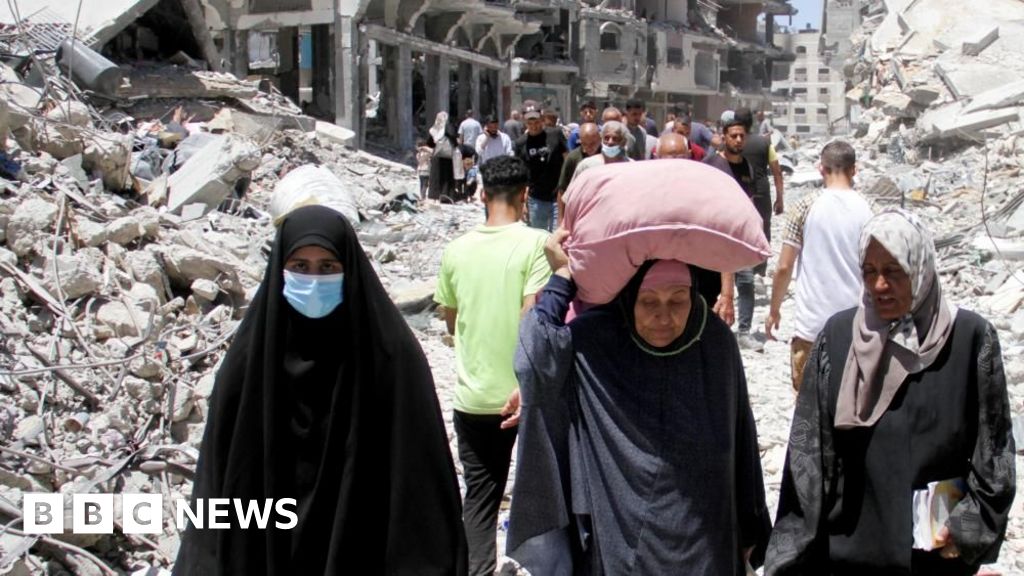For Hamas and Israeli leaders, ending the war in Gaza has become a deadly game of survival.
The conditions under which the war ultimately ends may largely determine their political future and control of power. For Hamas leader Yahya Sinwar, it’s even his physical survival.
This is part of the reason why previous negotiations failed. That’s why the question of how to end the fighting permanently has been pushed to the final stages of a plan outlined by U.S. President Joe Biden on Friday.
Biden acknowledged that the transition from talks on a limited hostage-for-prisoner deal to discussions of a permanent ceasefire would be “difficult.”
But it’s also the key to the success or failure of the latest deal.
Israeli Prime Minister Benjamin Netanyahu has good domestic reasons for wanting to move toward such a deal.
As Mr. Biden has outlined, the first phase would see the release of dozens of hostages, both survivors and dead. This will be widely welcomed in a country where the failure to free all those held by Hamas is to many a clear moral blemish on his management of the war.
But Hamas is unlikely to give up its most politically sensitive hostages — women, the wounded, the elderly — unless Israel can guarantee they will not easily restart the war upon their return.
Citing leaks, Israeli media reported on Monday morning that Benjamin Netanyahu had told his parliamentary colleagues that Israel would be able to keep its options open.
Some believe that resuming fighting – until Hamas is “annihilated” – is an option that Mr Netanyahu’s far-right coalition partners will at least demand.
Without their support, he faces the prospect of snap elections and a continuation of his corruption trial.
Mr Netanyahu needs to keep his long-term options open to have a chance of winning their support for any preliminary hostage deal. On the other hand, Hamas leaders may want to secure upfront guarantees of a permanent ceasefire.
Previous deals have fallen into this chasm. Whether the problem can now be bridged will depend on how much leeway Netanyahu and his far-right government allies have to find alternatives to “eliminating” Hamas — and how far Hamas leaders are prepared to consider these plans.
Netanyahu spoke over the weekend of destroying Hamas’s “military and governance capabilities” and ensuring the group no longer poses a threat to Israel.
Few dispute that Hamas’s military infrastructure has suffered significant losses – some even say Hamas has suffered significant losses in its public support and control of the streets in Gaza.
But there is no sign that Israel has killed or captured its top leaders Yahya Sinwar and Mohammad Deif, leaving them free to remain in Gaza to celebrate the withdrawal of Israeli troops, a move that would cause trouble for the embattled Israeli prime minister. Come political disaster.
Yanir Cozin, a diplomatic correspondent for Israeli military broadcaster GLZ, believes Mr Netanyahu will not end the war until he sees it as a success.
“The agreement to leave Hamas is a huge failure,” he said. “Eight months have passed, and when you haven’t achieved any of the war’s goals — without destroying Hamas, bringing back all the hostages, or securing the borders — then he doesn’t want to end the war. But he also understands that he can’t leave it behind. Until Israel’s next elections in 2026.
“If he can say, ‘We exiled Yahya Sinwar and Mohammed Deif, they don’t live in Gaza’ — if people who live in Gaza and around the northern border can go back — I think he It’s possible to keep his government together, but there are a lot of ‘ifs’.
Hamas is unlikely to agree to exile or surrender its top figures. But clear divisions have emerged among Hamas leaders inside and outside Gaza.
Former Israeli Prime Minister and Defense Minister Ehud Barak told Israeli radio on Monday that President Biden announced the deal “after seeing that Netanyahu would only act if he was sure that Sinwar would reject it.”
“How do you think Sinwar would react when he was inclined to agree and then he was told: But hurry up because we still have to kill you after you return all the hostages,” he said.
Meanwhile, tens of thousands of Israelis displaced after the Oct. 7 Hamas attack are watching the prime minister’s next steps.
Among them was Yarin Sultan, 31, a mother of three who fled her home in Sderot on the Gaza border the morning after the Hamas attack. She said she would not return home until Yahya Sinwar and Mohammad Deif were no longer free.
“A ceasefire will kill us,” she told the BBC. “We will release the hostages, but in a few years you will be the next hostages, you will be the next people to be murdered, the women to be raped – all of this will happen again.”
Additional reporting by Rushdie Aboualuf

